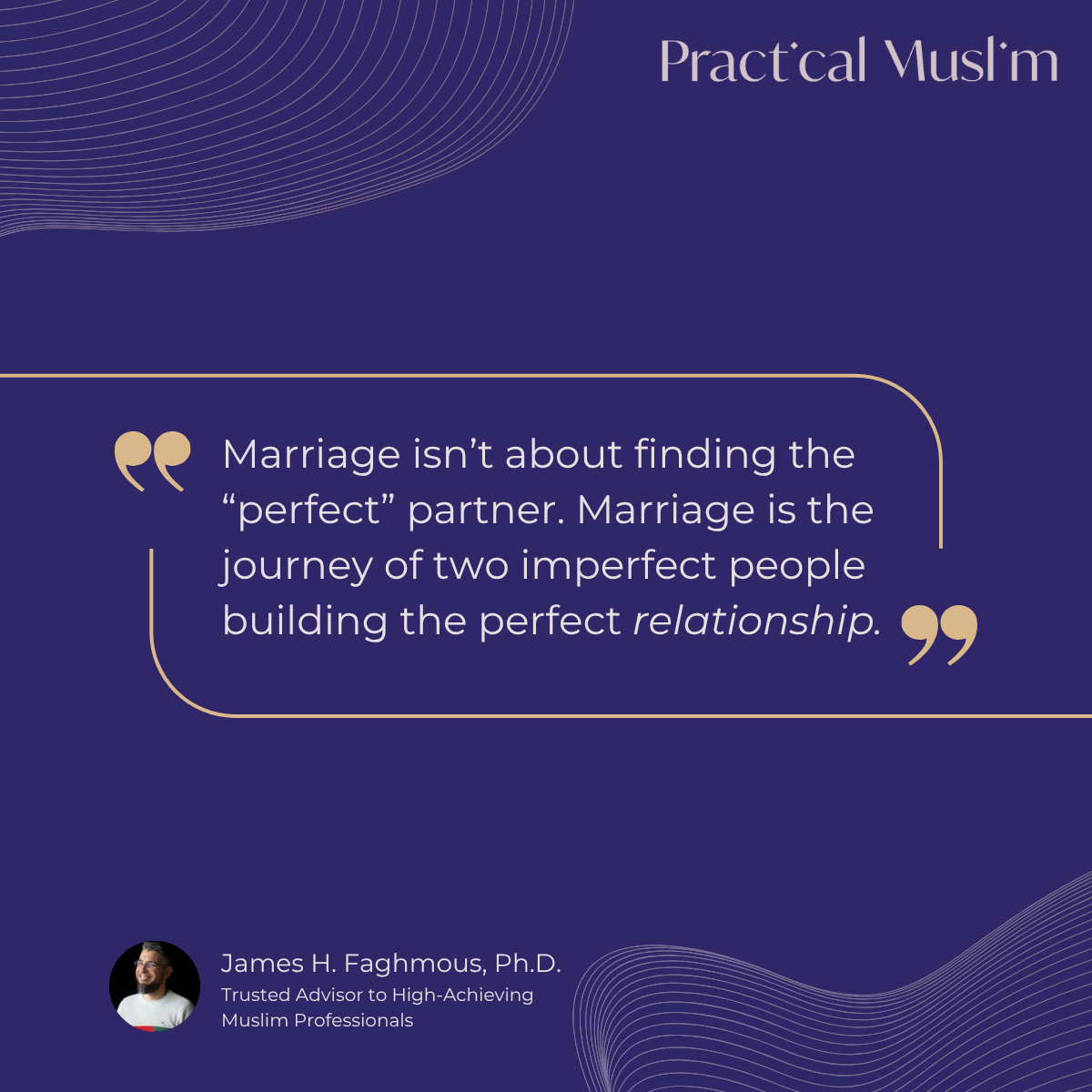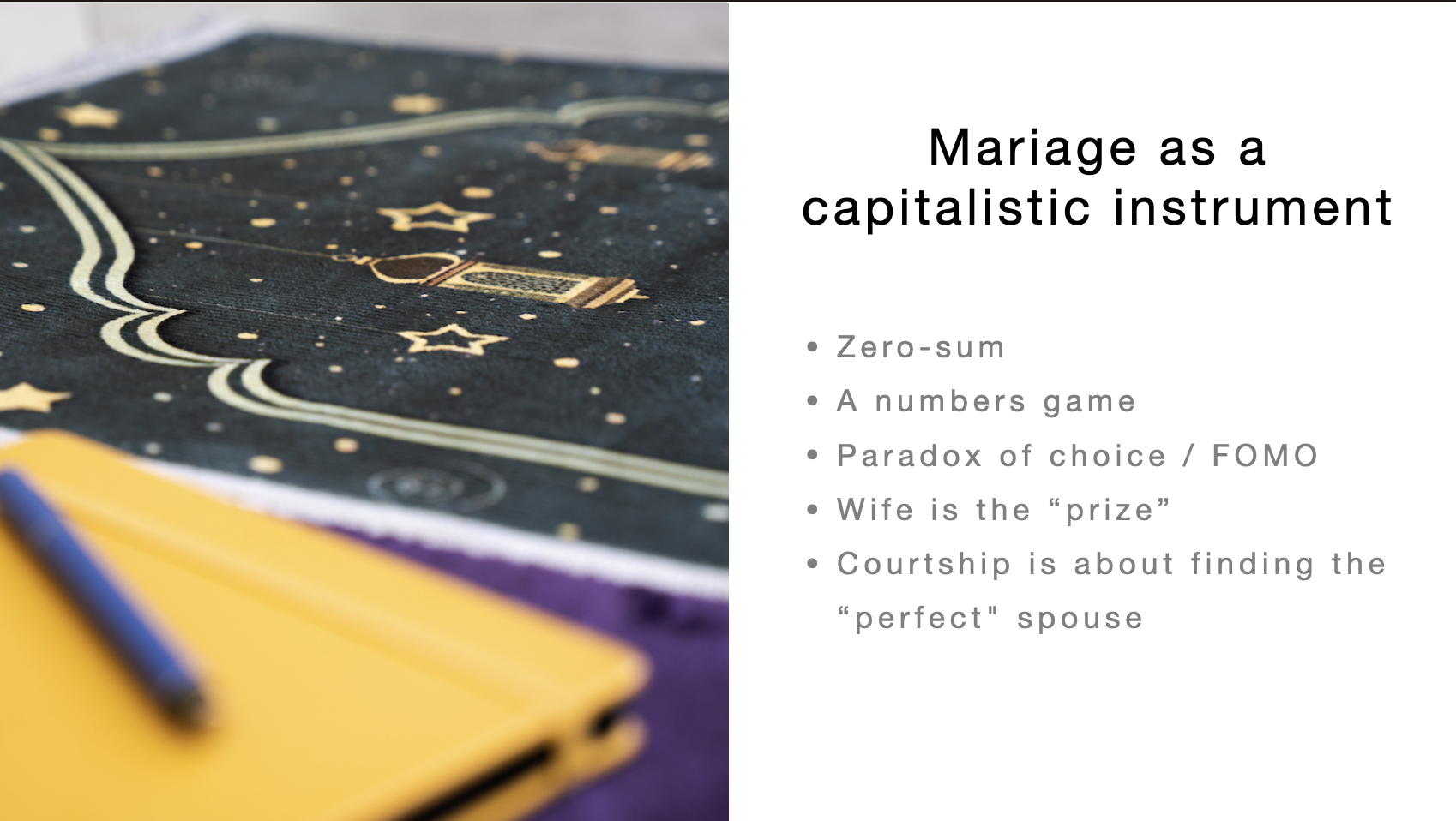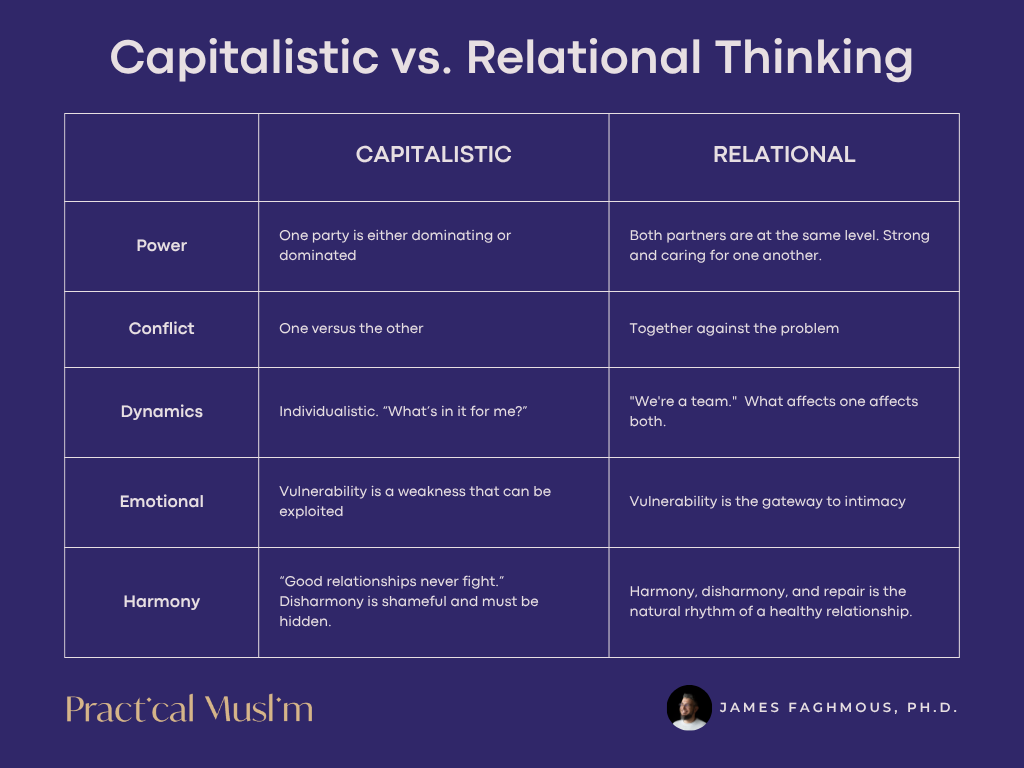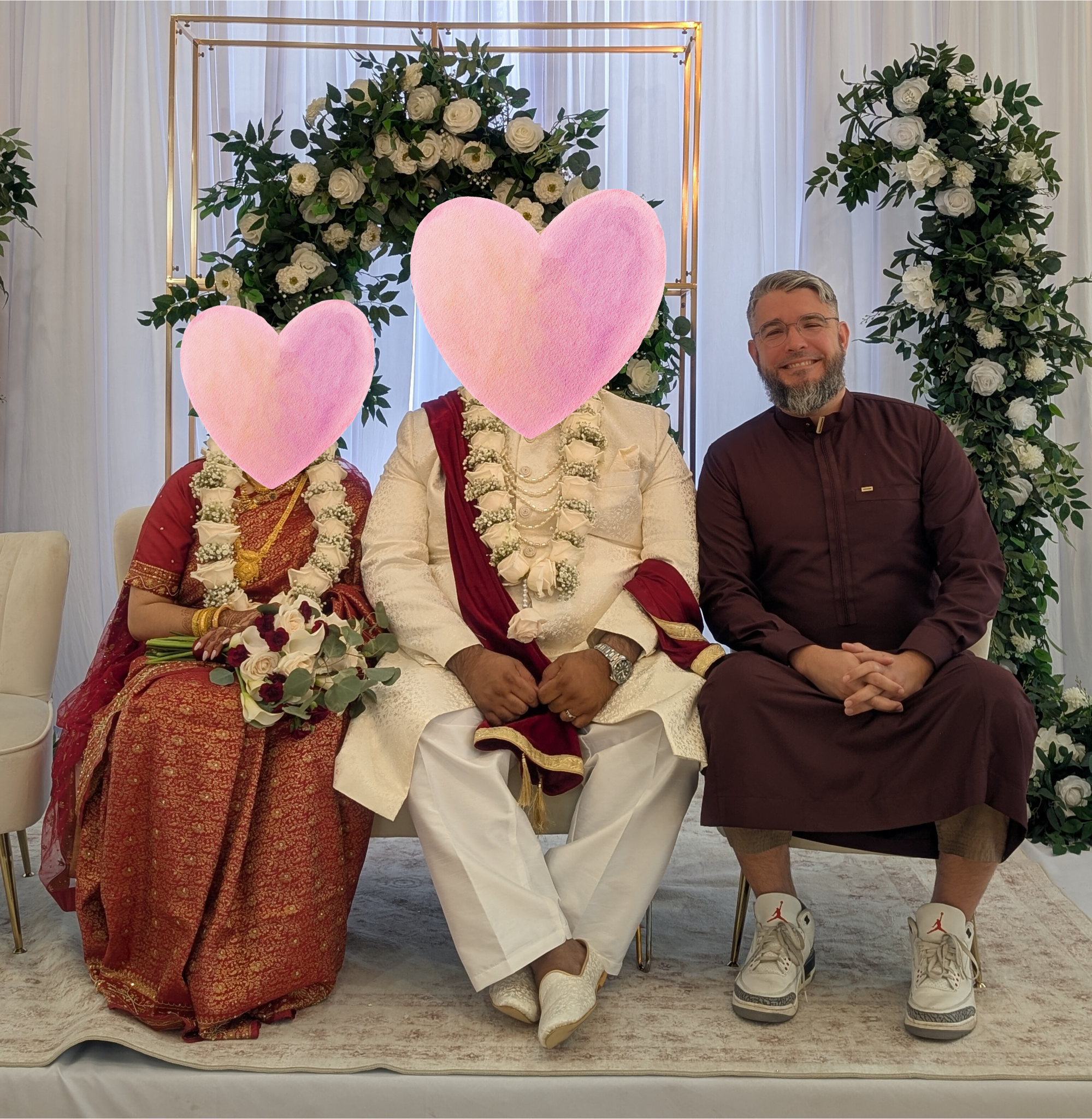Community Highlight: Fedpath Advisors is hosting a Federal Grants Lunch and Learn for individuals and organizations interested in applying for federal assistance, either now or in the future. This session will provide an overview of different types of federal assistance, with a focus on federal grants management.
Salaam!
I recently sat with a successful tech founder who'd built a multimillion-dollar company before turning thirty-five. He opened his laptop to show me something that stopped me cold: a spreadsheet tracking forty-seven women he'd talked to in the past three years. Color-coded columns for education, career, religiosity, family background. Weighted scores for compatibility metrics.
"I optimize everything in my life," he said. "Why can't I optimize this?"
I asked him to close the laptop and said, "When was the last time someone really saw you? Not your résumé, not your potential, but you?"
That was the first time he didn’t have something to say the entire conversation. 😂
And that, ladies and gentlemen, is the real Muslim marriage crisis.
Not the surface complaints flooding our social media feeds, that women are too ambitious, that men are too passive, that everyone's standards are impossible.
In the past century, capitalism has colonized our homelands... and now, our hearts. Today, capitalism’s cold, heartless logic has invaded the most sacred space of human connection, and that is the real cause of the Muslim marriage crisis.
The clearest sign that capitalism has hijacked marriage, and relationships in general, is how we search for the “best” or “perfect” partner, and at the first sign of a “red flag,” we move on to the next person like they’re a defective fruit.
Here's the spiritually intelligent reframe:
Marriage isn’t about finding the "perfect" partner (hint: they don’t exist). Marriage is the journey of two imperfect people building a perfect relationship (for them).

The Marriage Crisis "Boogeyman"
Scroll through social media and you’ll find the usual suspects being blamed for why marriage has become so difficult. Women who want careers are “too masculine.” Men who struggle financially are “not real providers.” Everyone’s “too picky,” with unrealistic expectations.
These narratives spread like wildfire because they offer what we desperately want: simple villains for complex problems. It’s easier to blame ambitious women or struggling men than to examine the system that taught us to treat each other like investment prospectuses.
Looking only at the surface, it’s true that both men and women are acting out of alignment, which makes marriage extremely difficult:
Men are afraid of commitment, insecure, lack leadership and initiative, generally falling behind in education and earning relative to women, and are increasingly blaming women for their woes (there’s a great book on this subject called Of Boys and Men). Women are increasingly in their masculine energy: competing for degrees, promotions, and higher incomes. Many have also been traumatized and let down, and now overly focus on materialism as a way to cover that pain.
But beyond these general caricatures, very few people, especially in the Muslim community, are asking why that is.
The simplest answer is: capitalism.
The skills we use to excel in a capitalistic society fail abysmally when applied to marriage. What’s more concerning is that we’ve come to see marriage as yet another capitalistic endeavor.
For example, here’s a snippet from a post by a well-known “Muslim personality” discussing the marriage crisis:

What this statement is really saying is: we need marriages to keep working men happy and to produce more children to fuel the capitalist machine.
What makes this especially dangerous is that it comes from a reputable Muslim figure, and it’s sandwiched between Islamic terms, giving it the illusion of religious legitimacy, when in reality, it’s just plain old Capitalism 101.
This isn’t a critique of the individual. In fact, it’s not even his fault. He explicitly states, “as someone in investments/finance,” so his perspective is clearly shaped by a capitalistic lens.
The scary part is how widespread this mindset has become, even if the specifics vary from person to person.
So, if you’ve been struggling to get married - or are finding marriage harder than it should be - one of the first things to examine is:
Am I approaching marriage from capitalistic mindset?
Here are a few signs that capitalism may be poisoning your marriage or search for love:

How Capitalism Colonized Our Hearts
The marketplace mentality has infected how we think about love at every level, and we've internalized its brutal logic without realizing it.
Consider how naturally these concepts flow into our marriage conversations:
We talk about "investing" in relationships, expecting returns on our emotional labor. We measure our "market value" against others, constantly calculating whether we're getting the best deal possible. We experience FOMO, that nagging sense that someone better might be just one swipe away. We treat vulnerability like weakness, something that diminishes our negotiating position.
Under capitalism, we're taught that relationships operate on power dynamics. Someone's always above or below, but never together on the same level. Men learn that their value equals their bank account. Women learn that their value equals their desirability and compliance. Capitalism teaches us that love is something you win, not something you build.
Capitalism ruins courtships because people are too guarded and unwilling to be vulnerable. Everyone’s trying not to “get played,” so they assume a man-vs-woman stance.
That is why we see the man who approaches marriage conversations like job interviews: rapid-firing questions about five-year plans before asking what brings the woman joy. Or the woman who crafts the perfect marriage resume while hiding the beautiful messiness of being human. Or the families who negotiate mahr like corporate mergers, forgetting it was meant to be a spiritual practice of honor and protection.
So, as you can see, the problem isn’t exorbitant dowries or men who fear commitment. Those are just symptoms of a world colonized by capitalism.
So what's the solution?
We need an entirely new way to think about relationships.
Relational thinking
Family therapist Terry Real introduced the concept of relational thinking, which centers the relationship itself over the individuals within it - a direct challenge to the hyper-individualism of capitalism.
For years, I’ve coached ambitious Muslims using my own version of relational thinking, helping high-achievers (in the capitalistic sense) prioritize connection over ego, and partnership over performance.
And this isn't just something I teach. It's something I’ve had to live in my own life.
Back in 2007, when I first met Zahra, I was a high-achieving PhD student. I’d been nominated for a Rhodes Scholarship, awarded multiple prestigious graduate fellowships from the NIH and NSF, and was working in one of the hottest fields at the time: computational neuroscience. To say that my ego was inflated by these (capitalistic) accomplishments would be an understatement 😅
A few months into our courtship, Zahra and I decided to move forward with marriage. We had even started designing our wedding invitations for a ceremony scheduled four months later.
But then something happened.
A pattern emerged, where I repeatedly dismissed Zahra’s opinions, in both small and significant matters. This didn’t sit well with her. In fact, it bothered her so deeply that she broke off our engagement.
I was completely blindsided, and in hindsight, I’m deeply grateful for it. That breakup was a wake-up call: a moment of clarity in which I had to decide whether I would cling to my ego or fight for the relationship I wanted.
Thankfully, I listened. I took Zahra's feedback seriously and vowed to change. It wasn’t easy. It hurt my ego to admit I was wrong and even more to do the inner work required to repair what I had damaged. But that choice saved our relationship.
I'm grateful every day that I chose us over my ego.
Relational thinking aligns deeply with the Islamic view of marriage, best illustrated in this verse:
“They are garments for you, and you are garments for them.” [2:187]
This ayah perfectly reflects relational thinking: man and woman as garments for one another. Equal in value, mutual in function, and both essential. Each provides comfort, protection, intimacy, and a reflection of dignity. Neither is dominant. Neither is disposable.
Relational vs. Capitalistic Thinking
So what happens when we shift from capitalistic to relational thinking?
We start approaching and showing up in our courtships and marriages very differently.
Under a capitalistic approach you showed up as:
- One person wins, the other loses
- Relationships operate through control and accommodation
- You think individually "What's in it for me?" rather than "What's good for us?"
- Vulnerability is seen as a weakness
- Power means dominance over your partner
- You're either in control or being controlled
- You operate from your adaptive child (the reactive, self-protective part formed in childhood) instead of your wise adult self.
This is the marketplace mindset: purely individualistic, ego-driven, and deeply disconnected. You constantly have to defend your standing in the relationship rather than experience real intimacy.
In contrast, relational thinking transforms how we show up:
- You think as a team: The question of “who’s right or wrong?” becomes “who cares?” What matters is what works for both of you.
- Power is shared: You can advocate for yourself while cherishing your partner in the same breath.
- Both people can be strong AND connected: You don't have to choose between having a voice and having intimacy
- Vulnerability becomes strength: It's the doorway to emotional safety and true connection.
- The goal is collaboration, not victory: You're co-creating something together
erry Real gives a powerful example:
Instead of saying, “You’re a bad driver” (a blame-based, patriarchal stance),
try saying: “Honey, I know you love me. When you drive fast, I get scared. As a favor to me, could you slow down?”
That’s relational language, where love is expressed not through control or critique, but through emotional responsibility and mutual care.

This past weekend, I had the honor of attending the wedding of a client whose journey perfectly reflects the shift from capitalistic to relational thinking.
When he joined my coaching program, he was already a top-tier professional known nationally in his field. But that same high-performance mindset that served him in his career was quietly sabotaging his relationships. While he had no trouble meeting potential partners, the connections never lasted.
Our work together began by re-centering his life around relationships instead of his career. Not just romantic relationships, but his relationship with himself, his past, and with God. Through a series of intentional steps, he moved from self-protection to emotional openness, from checklist dating to a genuine willingness to co-create a relationship. Not only he got married, he did so without the dating apps because we stoped searching for the perfect person, and instead committed to building the perfect relationship. Now, he’s not just married. He’s emotionally available, spiritually grounded, and building a life that reflects who he truly is - not just what he’s achieved.

The Prize is the Relationship
So what's the point of marriage?
Marriage isn't about finally landing a husband or wife, or a status symbol, or to increase wealth. It's not even about companionship, procreation, or "half your deen". These are all just byproducts, no the main point.
The point of marriage isn’t material at all.
The point is the relationship itself.
The prize of marriage is the relationship. Not what it gives you. Not what it proves. Simply being in it.
That’s why the relationship must be your North Star.
Not your image. Not your ego. Not the roles.
The relationship.
But why is the relationship prize?
Because a divinely sanctioned relationship unlocks spiritual and emotional blessings that are unavailable in any other context.
“And among His signs is that He created for you from yourselves mates that you may find tranquility (sakinah) in them; and He placed between you affection (mawadda) and mercy (rahma). Indeed in that are signs for a people who reflect.” [30:21]
This ayah beautifully reframes our entire mindset around marriage.
Allah emphasizes emotional safety (sakina), affection (mawadda), and mercy (rahma) and these experiences are only available in a sacred marriage.
Yes, you might experience love, peace, and mercy while single. But there’s a special flavor that is only accessible through a relationship sanctioned by God.
So much so that Allah states that marriage is a sign of God, not just a contract or transaction. Of course you may experience love, emotional safety, and mercy while single but there is a special "flavor" that is only accessible when in a divinely sanctioned marriage.
So when we reduce marriage to a transaction, contract, or performance of expectations, we miss the whole point.
The real reward isn’t the ring, the wedding, or the spouse.
The reward is the relationship.
A living, breathing sign of Allah’s Mercy in your life.
The Hidden Victims of Patriarchy
We don’t talk enough about how patriarchy harms men, especially in the Muslim community.
Yes, patriarchy has oppressed women for centuries. That’s clear. But what’s less obvious (and more taboo to name) is that men are also victims of the very system they’re told will empower them.
Patriarchy promised men that:
- Dominance would bring lov
- Provision would earn connection
- Emotional suppression would make them strong.
Instead, it's left many emotionally bankrupt and desperately lonely. 15% of men report having no close friends (a 5x increase since 1990). Men are also four times more likely to die by suicide.
The men who come to me aren't the caricatures seen in online debates. They're not loud, fragile egos trying to control women. They’re accomplished professionals. Respected in their fields. But they’re suffering in silence.
They've spent decades building their provider credentials, while their emotional intelligence atrophied. They don't know how to be vulnerable without feeling weak. They don't know how to share power without feeling diminished. They don't know how to receive love without feeling indebted. The don't know how to derive self-worth outside of work and accolades.
A surgeon told me:
"I spent fifteen years becoming everything women supposedly want. But I have no idea who I actually am beyond my achievements."
The rise of toxic masculinity influencers among young Muslim men isn't just about misogyny. It's about the desperate hunger for masculine identity in a world that offers only impossible extremes: be a dominant "alpha" or be a weak "simp".
Where's the middle path as modeled by the Prophet ﷺ? The example of strength without domination, tenderness without weakness, and leadership through presence?
bell hooks wrote that patriarchy wounds everyone, including men. They're promised that control brings connection. However, you cannot dominate what you cherish. You cannot possess what you honor. Control and love cannot coexist.
It’s time we start unlearning the lie that patriarchy is power.
Because real strength, Prophetic strength, is found not in dominance…
…but in dignity, mercy, and connection.
From Strategy to Soul
Every week, someone asks me for the optimal marriage strategy. Which apps work best? How should they craft their bio? What's the ideal timeline from meeting to marriage?
That's the very capitalistic playbook keeping you stuck! We have to take a relational approach which requires surrender and trust in Allah.
Marriage isn't a problem to solve, it's a process to surrender to. It requires trust. In Allah. In the process. In yourself. In someone else.
That's why in my book "Before 'I Do': 150 Questions Muslims Must Ask Before Marriage," I don't offer hacks or scripts. I offer invitations to to self-awareness, to honest dialogue, to relational depth.
Because love isn’t found in the perfect swipe.
The couples who have built miraculous marriages didn't crack some secret code. They abandoned capitalistic thinking and embraced relational thinking. Instead of asking "What can I get?" they asked "What kind of relationship can we create together?"
Capitalistic thinking isn't just keeping Muslims single, it is also poisoning marriages. I recently worked with a couple stuck in an endless negotiation loop. Every conversation was a power struggle. Who sacrifices more? Who deserves what? Always bringing up the "rights and responsibilities" of the spouses. They were approaching marriage as opponents playing on opposite sides of the net, instead of teammates for the home team.
What's interesting is that if you want to experience relational thinking, you don't need to be looking to get married. You just have to prioritize a relationship over your ego, and that starts with your relationship with yourself and with God. Re-centering our lives around these relationships will result in profound changes compared to an ego-centric existence.
The Real Questions
If you're ready to abandon capitalistic thinking for something more sacred, start by sitting with these questions:
- What if your spouse isn't meant to complete you, but to lovingly challenge you toward your own completion?
- What if the broken edges of two imperfect people could create something whole?
- What if marriage is meant to be a sanctuary, not a trophy - a place where two souls practice being human together, falling and rising, breaking and healing, always held by a desire to grow closer to God?
- What if the person meant for you won't arrive as a finished product but as moldable clay, ready to take shape as you walk the path together?
- How would you show up if you didn’t have to impress anyone, defend yourself, or “win” someone over?
- How would you approach love if you trusted that Allah was protecting you, and you no longer had to protect yourself from “being played”?
These aren't questions you can spreadsheet your way through. They require a different kind of intelligence - spiritual intelligence: the wisdom of the spirit that knows what the mind cannot comprehend.
From Transaction to Transformation
The Muslim marriage crisis isn't about ambitious women or passive men. It's not about unrealistic standards or impossible economics. It's about a community that's forgotten that marriage is a spiritual act, not a social achievement.
We've been so colonized by capitalism that we've turned even our most sacred connections into transactions. We evaluate partners like investments. We protect ourselves like assets. We negotiate love like a business deal where someone wins and someone loses.
But real love, the kind the Prophet ﷺ modeled, exists in that sacred space between two people brave enough to show up as they actually are. Wounded and wondering. Hoping and human. Ready to build something that serves not just themselves but the divine purpose that brought them together.
I am not advocating for lowering standards or settling for less. It's about approaching marriage from a completely different point of view. It's about recognizing that the person meant for you won't fit your spreadsheet. They'll break it open and invite you into something bigger than either of you imagined.
Marriage isn't something you find. It's something you build, day by day, with someone brave enough to build it with you. And that kind of courage? That's the real Islamic revolution we need.
What would change if you approached your next conversation with a potential spouse not as an interview but as an invitation to be truly who you are?
Reply to this email and let me know!
Peace and blessings
James



